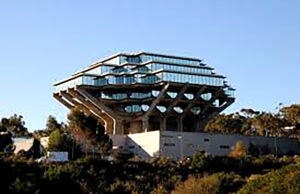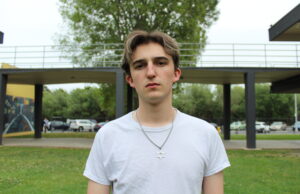Youth voices will not be silenced
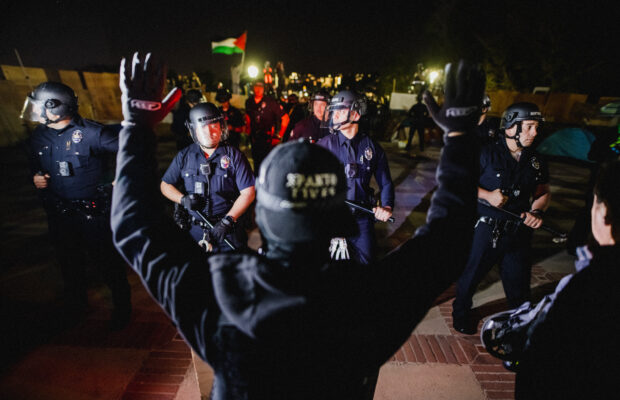
College students across the United States have jeopardized their chances of celebrating a traditional graduation season. USC canceled graduation citing concern for violent uprisings because the valedictorian is a known activist for Gaza victims. Attributing a greater importance to the Gaza Solidarity Encampment Movement, students are demanding university divestment from any economic ties with the country of Israel while university administrators have been navigating a balance between upholding First Amendment rights and attempting to ensure campus safety. In an attempt to achieve this, universities have utilized police enforcement to control protests and encampments. From the students perspective, police brutality has led to accusations of bias protection and interference of First Amendment rights, causing further tensions on campuses.
Beginning in mid-April, protests began at Columbia University in New York and have spread throughout the rest of the country. Students have sparked a wave of demonstrations that has brought millions of passionate voices from all ideological perspectives, creating an atmosphere that mirrors the global issue. Israel has maintained military presence since 1967 in the occupied territories of Gaza and the West Bank. On Oct. 7, 2023, Hamas, the Palestinian governing body, launched a terrorist attack on Israel that further escalated the already intense conflict. According to Israel tallies, approximately 1,200 citizens have been killed as well as 250 held hostage. According to the United Nations Office of the Coordination of Humanitarian Affairs, approximately 35,000 Palestinian deaths have been recorded as well as an additional 10,000 bodies unidentified and missing under the rubble. The constant fear expressed from citizens extends far beyond the Middle East, inspiring activist movements amongst university campuses.
At universities such as the University of Southern California (USC), Pro-Palestinian organizations have been waving Palestinian flags and chanting, “Free Palestine” messages while Pro-Israel groups have been defending Israel’s rights to protect itself against terrorism. These powerful scenes have led to similar events at the University of California Berkeley (UCB), the University of California Los Angeles (UCLA), Stanford, the University of California San Diego (UCSD), the University of California Irvine (UCI) and more schools emphasizing the meaning of the movements around campus.
Student protest movements have faced government police force in which students have previously been subjected to tear gas, beatings, and arrests, risking their lives expressing their beliefs. Regardless of individual philosophies on the conflict, students across the nation are unified in their actions of speaking out and taking a stance in order to spread awareness in an attempt to cease the unnecessary casualties and damages that have spurred from the Israel-Gaza crisis.
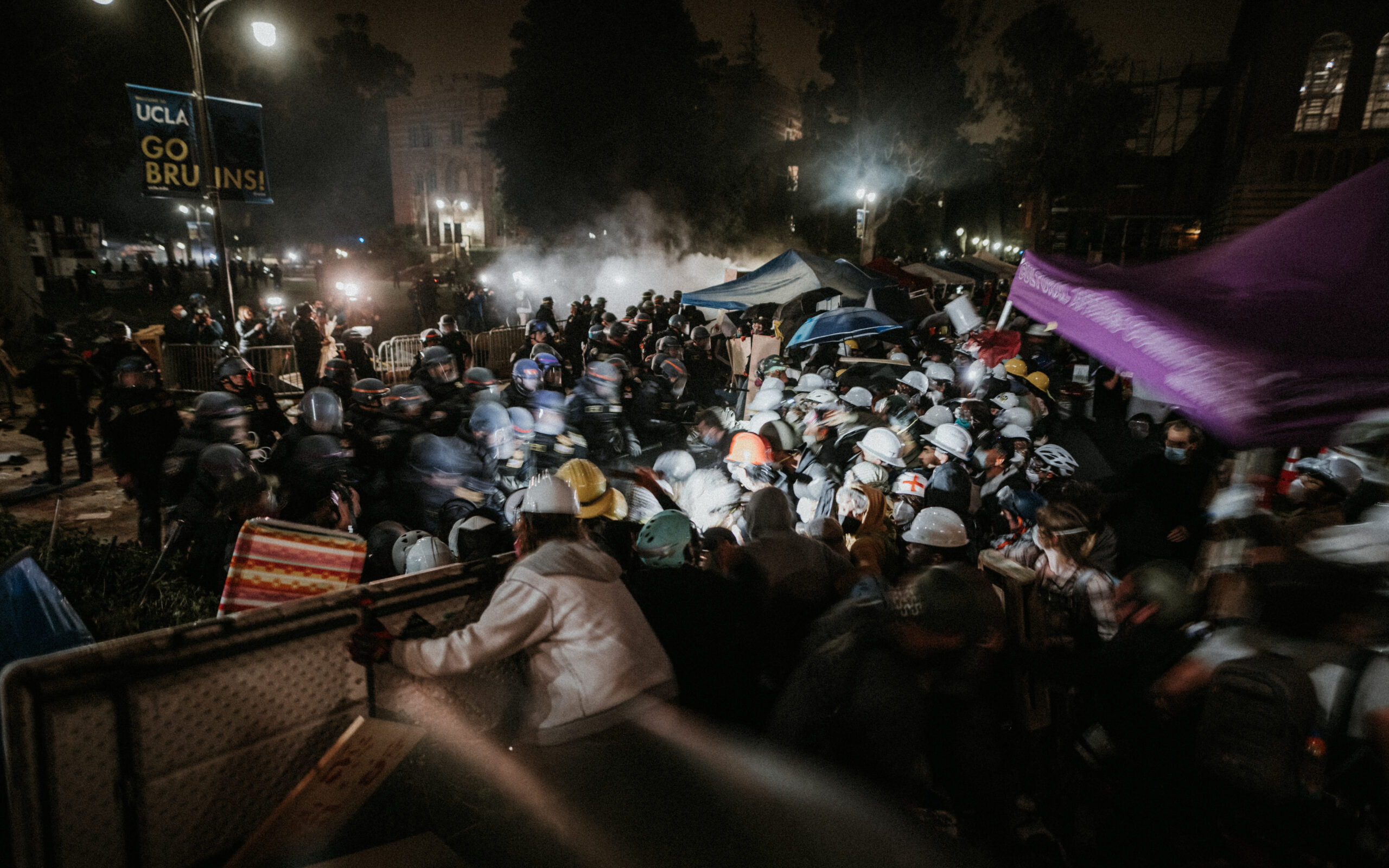
Educational Impacts
Seniors headed to university have watched the events unfold, which has impacted the choice of many when picking a school. Evan Sussman, senior, is headed to the University of California, Santa Barbara in the fall. He plans to study political science and learn about foreign diplomacy while studying abroad and in Washington D.C. “As someone who wants to go into the sphere, I just want to be able to have people who oppose or have different ideas be able to come to a discussion and see that while we’re so different in ideologies, we can still be similar,” Sussman said. On UCSB’s campus, “There’s a Pro-Palestine club, and there’s also an Israeli students club…and both sides protest every day. And they have that right to do so, and I’m not worried about that,” Sussman said.
However, not all university students have been granted this right. Throughout the rise of protests concerning the conflict, many students feel that they are being denied their voice and ability to stand up for their beliefs in protest. “There are other institutions I was considering going to, but that was a reason why I didn’t go there was because I’ve seen what’s been going on at those institutions and that first amendment right isn’t always guaranteed,” Sussman said.
Additionally, Sussman noticed that there has been a rise in anti-Semitism on UCSB’s campus as a result of the protests against Israel’s government, especially towards the former student body president, Tessa Veksler. “She’s been openly opposed to the rhetoric which has been spread throughout these protests. And it’s just a very nice connection to know that someone who is so similar to me…is proud enough to stand up for who they are and be proud of who they are,” Sussman said.
Elyse Grant, senior, is headed to Embry-Riddle Aeronautical University in Prescott, Arizona in the fall. Grant feels that Embry-Riddle will protect the first amendment rights of students, and that this impacted her decision when picking a school. “I wouldn’t want to attend a place that doesn’t allow their students to uplift the voices of people that they’re trying to protest for,” Grant said. Grant has followed the conflict closely and believes that social media is a useful tool in order to spread awareness. “I know half of the stuff on social media is going to be biased, so I make sure that before I go too deep into one side or one idea […] one opinion that’s being addressed, that I research it via […] unbiased news outlets,” Grant said.
Due to the use of the police force at protests, as well as arrests and expulsions, many feel that the goal of protestors and their cause has gained a negative connotation. “The media coverage has been more of the focus on the damage and disruption made from the protests rather than the underlying reasons or the message that the students are trying to get across. I hope that the universities would have addressed the reasons and the voices that the students were trying to display […] rather than shutting down campuses and canceling graduations,” Grant said. In terms of how to help those afflicted, many in the US feel overwhelmed and that they are unable to make a difference. However, Grant feels that it is important to direct one’s attention to those afflicted in Gaza. “A lot of people are uplifting the voices of Gazans or Palestinians facing genocide. I feel like that is the first step that is actually going to be much better than more violent ways of expressing what people want to be done,” Grant said.
Although there are discrepancies in the way any given student may choose to protest, or their thoughts on the conflict, the right to protest is generally seen as important across the younger generation. “I hope that students are granted the right to protest. It’s their first amendment, and whether you agree or disagree with what they are protesting for, that is their right. And universities need to respect that right,” Sussman said.
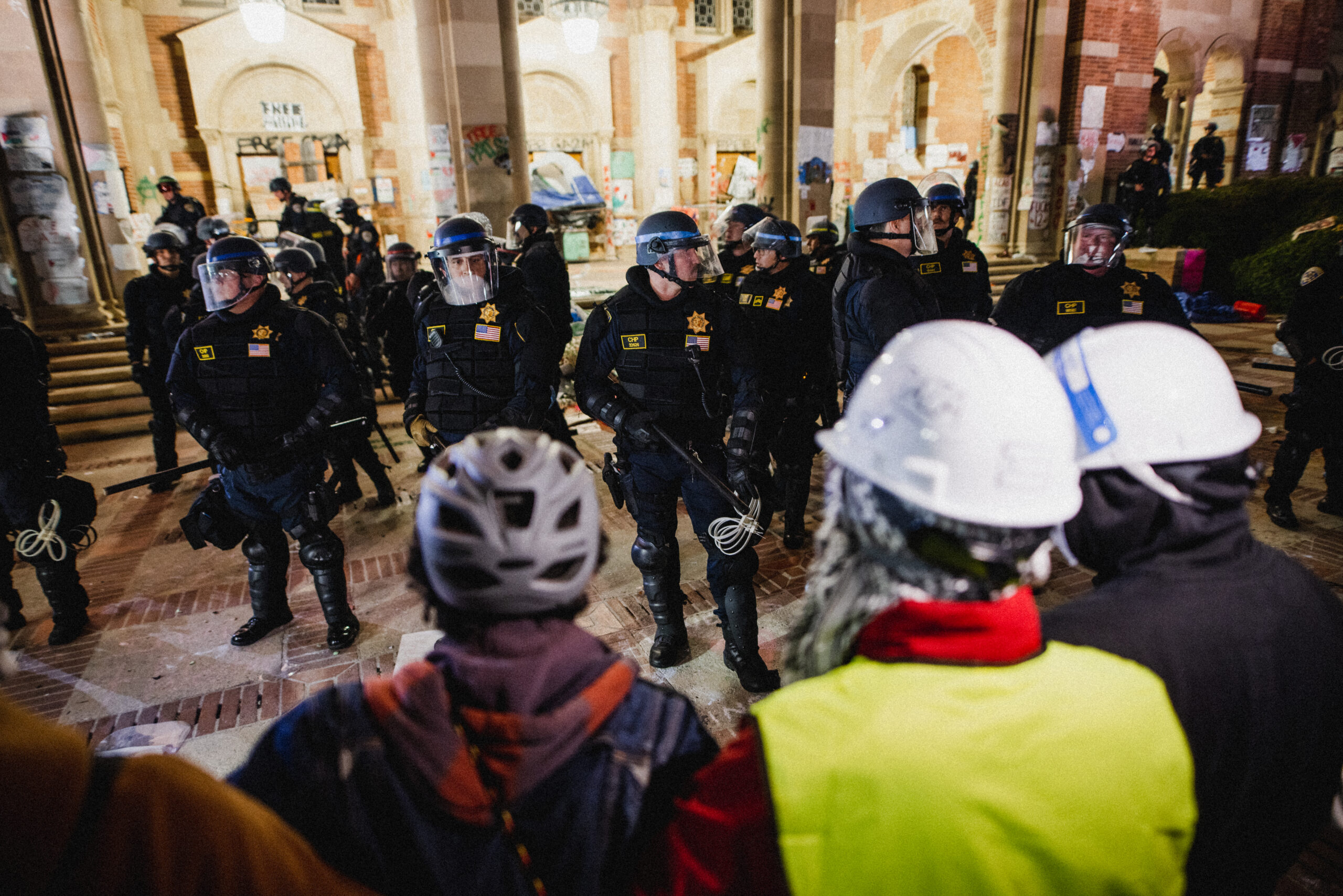
Students confronted by state violence across college campuses
Since the inception of the first Pro-Palestinian student encampment, there have been 75 instances of police force used on over 57 college campuses. As a result, currently 2,900 people have been arrested, according to the Associated Press. The Armed Conflict Location & Event Data Project (ACLED), states, “97% of student protests in America have been peaceful from October 7th, 2023, to May 3rd, 2024.” Despite this, on ground reports indicate that the police interventions have disturbed the peace through their often violent interactions with students. These demonstrations have increased eightfold in April compared to March.
According to ACLED, police have intervened against pro-Palestine demonstrations more than five-and-a-half times as often as pro-Israel demonstrations. However, several studies show that police presence increases the likelihood of violence occurring. Between 1967 and 1970, three presidential commissions investigated different riots; all came to the same conclusion: “Excessive force is an unwise tactic for handling disorder and often has the effect of magnifying turmoil, not diminishing it,” 1969 Eisenhower Study stated.
If a university has financial or political ties to the Israeli military and government, forcefully ending peaceful protests of opposing ideologies could potentially be considered political violence. UCSD’s most recent UC Annual Endowment Report shows their holdings in the Russell 3000 Stock Index, which includes shares of military contractors selling weapon technologies to the Israeli Defense Force. The United Nations World Health Organization, defines political violence as both physical and psychological acts aimed at injuring or intimidating populations.
Universities, including UCLA, and their affiliated police forces have allegedly engaged in actions that constitute political violence such as injury, intimidation, detention, arrests and shootings, with the use of “less lethal” rounds. While these rounds are considered less lethal, they can still cause significant harm and even death.
The Prowler filed a public records request to receive information on the encampment sweep and found that UCLA Chief of Police, John Thomas, intended to collaborate with the California Highway Patrol to end the encampment at 3:00 am on May 4 at UCLA. However, the sweep occurred two days prior.
Following the UCLA encampment sweep, a Cal-Matters investigation documented 25 instances of the California Highway Patrol (CHP) allegedly aiming firearms at crowds, vital organs and heads; this violates guidelines set by CA-AB48. “[In the video footage collected by CalMatters], officers appeared to aim their weapons at the eye level of protesters or fired them into crowds that didn’t appear to present an immediate threat to life or serious injury. In some instances, the officers approached kneeling protesters with the launchers aimed at point-blank range,” CalMatters wrote.
The violence was not unique to UCLA. At the UCSD raid, NPHS Prowler alumni Rose Colburn experienced the intentional threatening behavior from the law enforcement. “When I was getting arrested by the police, it became very clear to me that they didn’t see me even as slightly human,” Colburn said.
The Prowler requested the CHP officer’s body camera footage from May 2; however, their response wrote, “The Department does not possess responsive records.” This is because the CHP, the largest state police agency in the United States, is not required to wear body cameras or use dash cameras. Despite their annual budget of three billion dollars, only three percent of the 7,600 CHP officers were equipped with body cameras as of a 2022 CalMatters article.
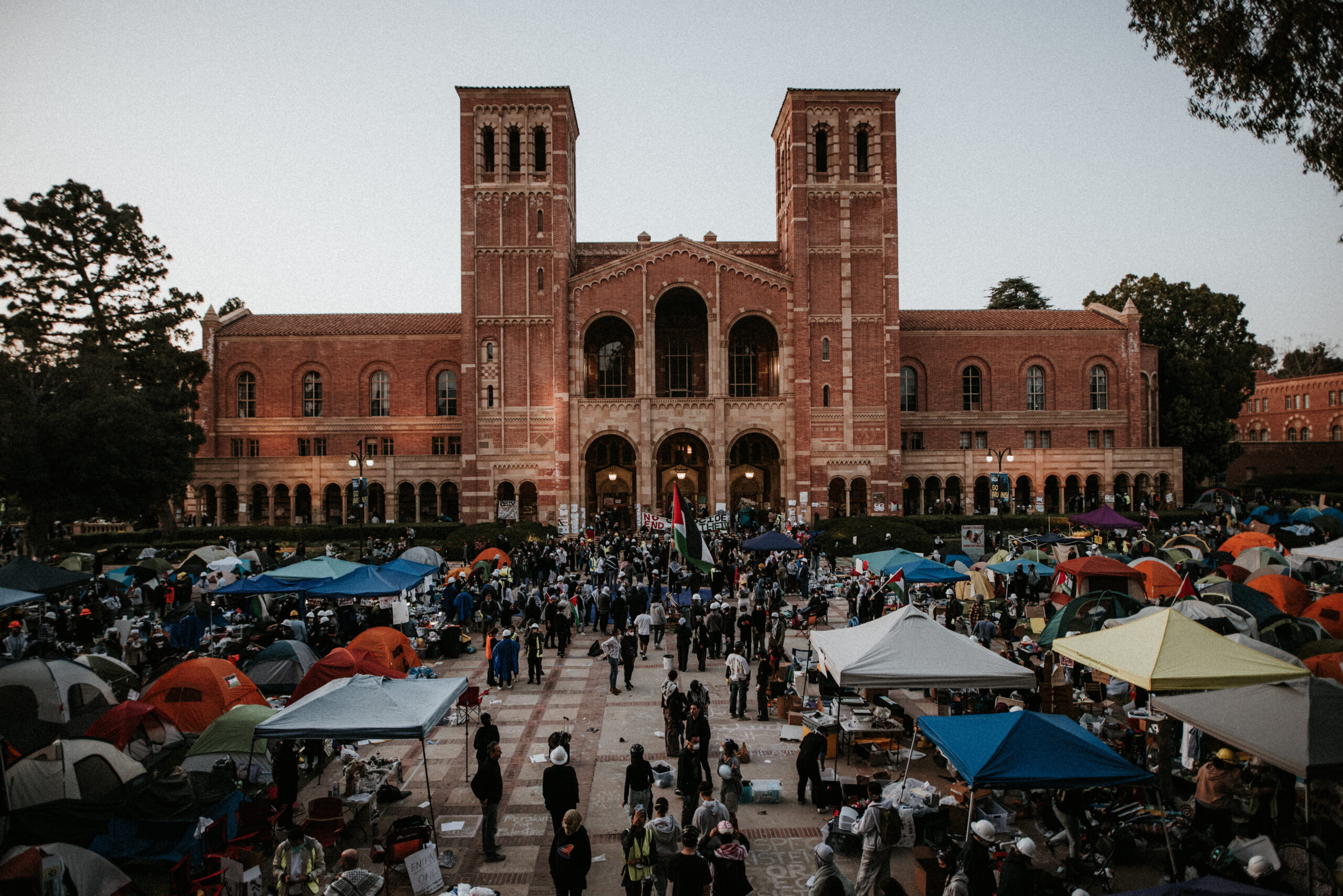
Students protest through unity
*The names Rose Colburn and Shane Elrod have been changed to protect the identity of students.
On April 17, 2024, Columbia University began the Gaza Solidarity Encampment Movement. Roughly 50 pro-Palestine student organizers pitched tents in the area outside the main library and soon the movement extended to over 70 other universities and colleges. The premise of the students’ movement is to advocate how their own tuition is being used to fund Israel’s military spending.
Students like Shane Elrod, an NPHS alumni at Swarthmore University, have compiled their efforts into this movement to hold private institutions accountable. “The work that our school does is actually killing people. Every single student and every single one of these higher education institutions has paid money that has led to the killing of a six year old or a three year old or a family in Gaza. All of us have actually paid a material impact because our schools have so much money that they give to Israel through all these different forms,” Elrod said.
Rose Colburn, NPHS alumni at UCSD, explains the intention of the encampment is to replicate the same type of occupation being criticized. “The goal isn’t to permanently camp there but rather to highlight the egregious police force, to highlight how attached administration is to this money and to demonstrate the corruption of our university,” Colburn said.
Through these acts of protests, students across campuses hoped to create awareness and advocate for action from their schools’ administration. “The actual hope of it was for universities to look at their students and respond with honest negotiations and for them to hopefully respect us as peers and equals,” Colburn said. However, the UCSD chancellor’s response did not meet the students’ expectations.
On May 6, the UCSD encampment was raided. “They turned our campus into a militarized state for the day. Our literal student center became a prison center and a detainment facility. They put snipers on the roof of the Student Health building, not a single part of that tells you that this school is supposed to be for education,” Colburn said. “The way that they raided us was so incisive, and so intentional, that you could tell that they were trying to strike fear into our hearts.”
The raid demonstrated a suppression of speech that further inspired more students to take part in the activism. “Students that were perhaps neutral on this issue before have completely turned against administration and have started calling for divestment along with radicalizing themselves and learning more about these issues that they are complicit in,” Colburn said.
Unsuccessful negotiations took place between the Students for Justice in Palestine (SJP) at Swarthmore and their administration. The passion and devotion that the students expressed was met with a lack of cooperation on Swarthmore’s part. “What we’ve learned is that our administrations do not value Palestinian lives as much as they value the money they make off of killing them,” Elrod said.
Many students have witnessed the silence of their fellow peers as the UCSD administration threatened students’ scholarships and grants if they participated in the encampment. Jill Walker, NPHS alumni at UCSD, advocates for continued resistance against this suppression. “You do have a voice even though they’re definitely going to try to make you feel like you shouldn’t speak on certain things because it might jeopardize your ability to remain at that school.”
The core of the Gaza Solidarity Movement stems from the belief that change can be brought through unity. “All of these stories are always going to be about hope. They tried so hard to tear me down, and yet here I am still going. Same thing for everybody else that’s been arrested and every student that is listed up for this moment,” Colburn said. Above all else, the people of Palestine inspire the movement with their resilience and serve as a reminder that the words within these protests advocate for compassion. “This is what resistance is, it’s giving a voice to the people whose voices are taken away from them. The people of Palestine are the strongest people in the world,” Elrod said.

